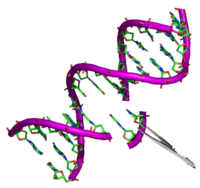
Photo from wikipedia
Sickle cell disease (SCD) and transfusion-dependent β-thalassemia (TDT) are the most prevalent monogenic disorders worldwide. Trial HGB-205 ( NCT02151526 ) aimed at evaluating gene therapy by autologous CD34+ cells transduced… Click to show full abstract
Sickle cell disease (SCD) and transfusion-dependent β-thalassemia (TDT) are the most prevalent monogenic disorders worldwide. Trial HGB-205 ( NCT02151526 ) aimed at evaluating gene therapy by autologous CD34+ cells transduced ex vivo with lentiviral vector BB305 that encodes the anti-sickling βA-T87Q-globin expressed in the erythroid lineage. HGB-205 is a phase 1/2, open-label, single-arm, non-randomized interventional study of 2-year duration at a single center, followed by observation in long-term follow-up studies LTF-303 ( NCT02633943 ) and LTF-307 ( NCT04628585 ) for TDT and SCD, respectively. Inclusion and exclusion criteria were similar to those for allogeneic transplantation but restricted to patients lacking geno-identical, histocompatible donors. Four patients with TDT and three patients with SCD, ages 13-21 years, were treated after busulfan myeloablation 4.6-7.9 years ago, with a median follow-up of 4.5 years. Key primary endpoints included mortality, engraftment, replication-competent lentivirus and clonal dominance. No adverse events related to the drug product were observed. Clinical remission and remediation of biological hallmarks of the disease have been sustained in two of the three patients with SCD, and frequency of transfusions was reduced in the third. The patients with TDT are all transfusion free with improvement of dyserythropoiesis and iron overload.
Journal Title: Nature medicine
Year Published: 2022
Link to full text (if available)
Share on Social Media: Sign Up to like & get
recommendations!